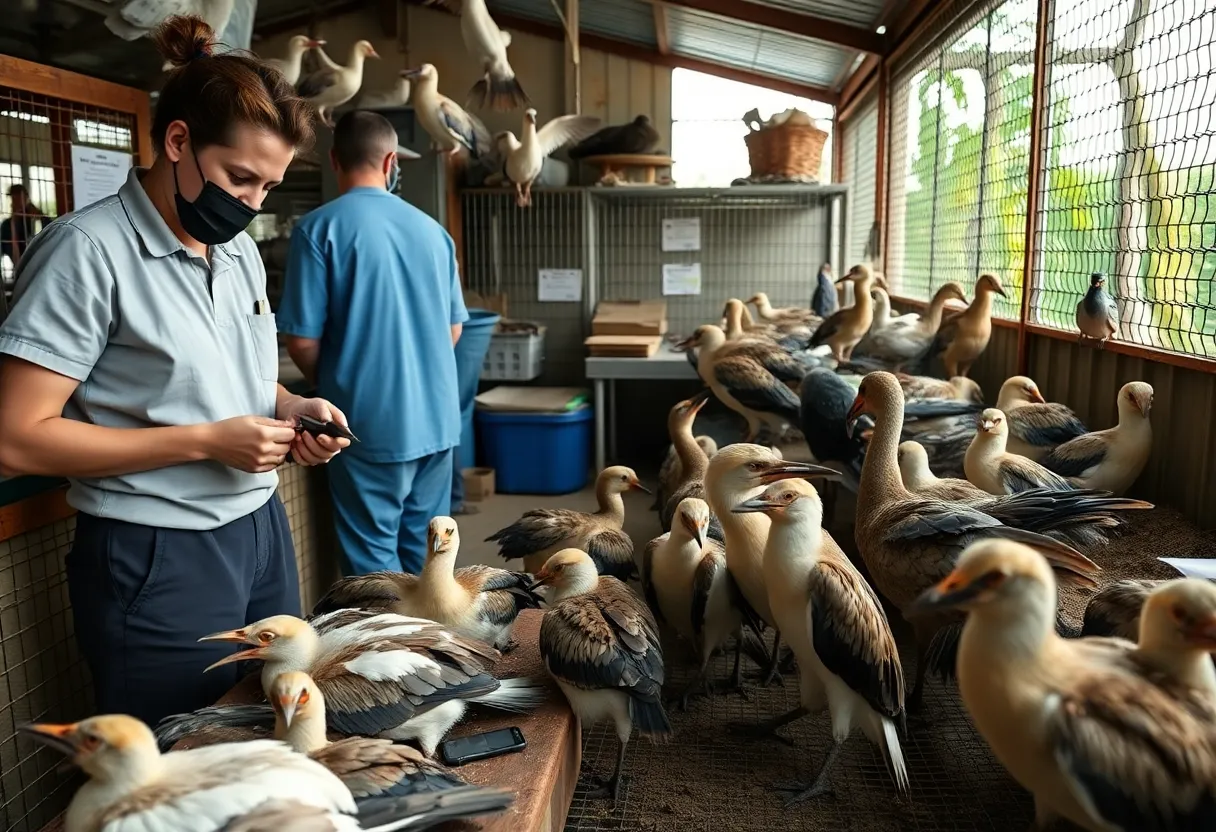News Summary
The Wetlands and Wildlife Care Center is grappling with an overwhelming influx of distressed animals, primarily due to a toxic algae bloom and the aftermath of recent wildfires. With over 600 animals in care, including more than 50 sick brown pelicans, the center is reaching out for financial assistance and volunteers to help manage the crisis. The situation highlights the urgent need for community involvement to support local wildlife during this alarming environmental challenge.
Huntington Beach – The Wetlands and Wildlife Care Center (WWCC) is currently overwhelmed, caring for over 600 animals, including more than 50 sick brown pelicans, amid a significant rise in wildlife distress due to a toxic algae bloom. The center has reported the largest influx of songbirds they have ever encountered, all requiring rehabilitation.
In addition to the influx of sick birds, WWCC is tending to 41 eggs, nestlings, and hatchlings that were displaced by the ongoing cleanup efforts related to the Eaton and Palisades fires. The conditions caused by these fires, alongside the harmful algae bloom, have exacerbated the situation, resulting in increased demand for animal care services.
Veterinarians at WWCC have identified that many seabirds are suffering from domoic acid toxicity, a condition caused by toxins released from the harmful algae bloom known as Pseudo-nitzschia. Symptoms of this condition include severe disorientation, seizures, inability to walk or fly, and emaciation due to the birds’ inability to find food. Many birds arriving at the center are in critical condition, and despite medical intervention, the success rate of recovery has been disappointingly low.
The center’s executive director has indicated the need for specialized volunteers and financial contributions to support ongoing efforts in caring for the increasingly large number of distressed birds. Juvenile songbirds, which make up a significant portion of the rehabilitation cases, will require an acclimation period of three to six weeks before being released back into the wild. This necessitates resources that the center is currently struggling to maintain.
Financially, WWCC’s operational costs are approximately $1 million annually, and the center is now reaching out to the public for support. Donations are needed for essential supplies, including towels, flat sheets, and toilet paper, in addition to direct financial contributions to help cover these mounting expenses.
Community members can play a pivotal role by reporting any distressed wildlife, especially birds, with photographs and GPS coordinates to help staff respond appropriately. Volunteers are also being sought, particularly those who can commit to at least one shift per week or possess experience in wildlife rehabilitation, to help alleviate the high demand for care services.
As the staff at WWCC continues to address the strain of caring for sick animals, there are concerns of compassion fatigue. The intensive hours dedicated to treatment and rehabilitation are mounting, creating a need for additional support to ensure that the center can continue to save as many birds as possible. The challenges faced by the center underscore the greater environmental issues caused by urban runoff and the toxic effects of pollutants released from recent wildfires that are impacting local wildlife.
A response to the current situation is critical as the health of the bird population in Southern California hangs in the balance. The community’s involvement, through donations and volunteer efforts, could significantly enhance the capabilities of WWCC to cope with this crisis.
Deeper Dive: News & Info About This Topic
HERE Resources
Additional Resources
- ABC7 News
- Google Search: sick brown pelicans Huntington Beach
- CBS News
- Encyclopedia Britannica: brown pelican
- KTLA News
- Google News: Wetlands Wildlife Care Center
- OC Register
- Wikipedia: Wildlife rehabilitation

Author: STAFF HERE COSTA MESA WRITER
The COSTA MESA STAFF WRITER represents the experienced team at HERECostaMesa.com, your go-to source for actionable local news and information in Costa Mesa, Orange County, and beyond. Specializing in "news you can use," we cover essential topics like product reviews for personal and business needs, local business directories, politics, real estate trends, neighborhood insights, and state news affecting the area—with deep expertise drawn from years of dedicated reporting and strong community input, including local press releases and business updates. We deliver top reporting on high-value events such as the OC Fair, Concerts in the Park, and Fish Fry. Our coverage extends to key organizations like the Costa Mesa Chamber of Commerce and Boys & Girls Clubs of Central Orange Coast, plus leading businesses in retail, fashion, and technology that power the local economy such as Vans, Experian, and South Coast Plaza. As part of the broader HERE network, including HEREAnaheim.com, HEREBeverlyHills.com, HERECoronado.com, HEREHollywood.com, HEREHuntingtonBeach.com, HERELongBeach.com, HERELosAngeles.com, HEREMissionViejo.com, HERESanDiego.com, and HERESantaAna.com, we provide comprehensive, credible insights into California's dynamic landscape.


